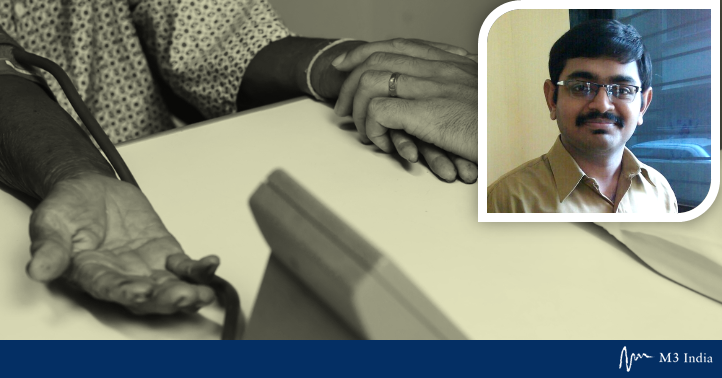Analysing India's vision of comprehensive primary healthcare: Dr. Soham D. Bhaduri
M3 India Newsdesk Aug 28, 2018
As India moves steadily towards becoming an economic super-power, shortfall in meeting basic health requirements and disturbed social determinants of health present as desperate challenges screaming to be addressed. While the recent brisk rise of interest in sanitation/nutrition programs and primary health care is indeed reassuring, diligent and concerted efforts will be required on a consistent basis for lasting health improvement. Among other things, it would entail re-embracing the philosophy of comprehensive primary care.

The recent excitement surrounding sanitation and nutrition initiatives and plans to go comprehensive in primary healthcare provision through proposed health and wellness centres suggest more to the perspicacious eye than simple welfare measures and gimmicks introduced to gain political mileage.
Somewhere, they bespeak cognizance of the fact that the existing design of healthcare pursued successfully over decades hasn’t served the nation well as far as addressing the larger challenges of public health are concerned, and that nothing would amount to much unless the fundamental problems concerning the social determinants of health are tackled.
The largest ever cleanliness drive in the country, Swachh Bharat Abhiyaan has helped pull attention towards some of the most fundamentally critical issues that not only imperil general health and social haleness but are also capable of undermining the effectiveness of the elaborate health initiatives that are being planned and envisioned for this country. Approaching its stated deadline in October 2019, the Swachh Bharat Abhiyaan definitely deserves an ode of praise and a good chunk of the credit for a considerable decline in the number of people defecating in the open since 2014.
Surely, we have been able to create centres affording superlative super-specialty care at much lesser costs relative to the US and have been able to erect a coveted hub of medical tourism, but this hasn’t helped us in meeting head-on the enormous challenges to health presented by widespread poverty, hunger, and insanitation.
One recalls with fulfilment the message of comprehensive primary health care and “Health for all by 2000 AD” that emanated from the Alma-Ata conference 40 years ago, and how it challenged the then prevailing, narrow medically-oriented approach to health espoused by nations like the US. Attended by 3000 delegates from 134 governments from around the world, never before had so many countries prepared to intensively for an international conference. Taking stock of the situation in developing countries, the Alma-Ata declaration enshrined a paradigm of healthcare that wasn’t restricted within the realm of hospitals, medicines, and targeted health initiatives. It saw ill-health as a hindrance for overall socio-economic betterment, inexorably linked with problems like poverty, hunger, squalor, and ignorance.
However, this comprehensive paradigm of healthcare would soon be criticised as overtly idealistic and unrealistically aspirational, and the consensus would soon rally behind specific and selective health programs with cut-and-dried targets and measurable indicators, projecting relative ease of implementation and a lesser drag on finite resources.
Today, our ailing social determinants of health present a formidable challenge and stare us square in the eye as we surge towards becoming an economic superpower. The traditional philosophy of selective healthcare and vertical health initiatives that have been favoured out of a tendency to make short-term gains with frugal expenditures have definitely helped us achieve some commendable feats, but nonetheless cannot be expected to holistically address our elemental public health concerns.
In the present day, none other than the already poor are plunged into abject destitution due to health expenses, and about 63 million Indians lack access to clean drinking water. And what else can evoke a greater sense of urgency for basic reforms than the fact that a country that prides itself as the fifth largest and the fastest growing economy in the world is left to reconcile with an estimated 48 million stunted children, foreboding an ineffectual future workforce, which could have otherwise made a pool of invaluable human capital, capable of bogging down the economic chariot.
The brisk rise of interest in nutrition and cleanliness drives surely sends across reassuring signals but doesn’t negate the fact that diligent and concerted efforts will be required on a consistent basis. The Swachh Bharat Abhiyaan is to still deal with about 20 crore people defecating in the open, and relatively backward states such as Uttar Pradesh and Bihar with below 60 percent sanitation coverage present a particularly formidable challenge.
Likewise, it will be vital to prioritize health and wellness centres with adequate funding and support, lest the goal of comprehensive primary healthcare shall never be realised. Now is the crucial moment to embrace for good the comprehensive and inclusive concept of health.
The writer is a medical doctor, an author, and executive editor of The Indian Practitioner, a peer-reviewed medical journal.
Disclaimer- The views and opinions expressed in this article are those of the author's and do not necessarily reflect the official policy or position of M3 India.
-
Exclusive Write-ups & Webinars by KOLs
-
Daily Quiz by specialty
-
Paid Market Research Surveys
-
Case discussions, News & Journals' summaries